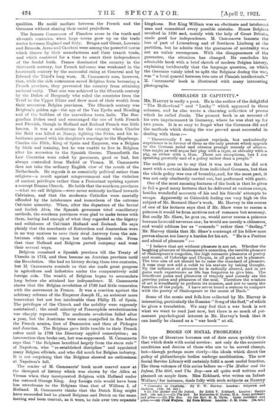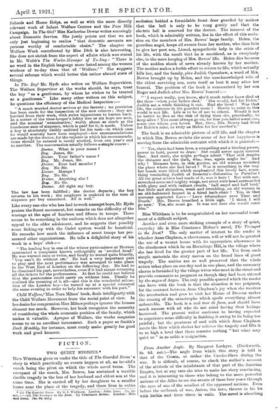BOOKS ON SOCLAL PROBLEMS.t No type of -literature becomes out
of date more quickly than that which deals with social service : not only do the economic conditions and desires of those who are to be served change, but—though perhaps more slowly—the ideals which direct the policy of philanthropic bodies undergo modification.. The new Social Service Library will certainly fulfil a most useful function. The three volumes of this series before us—The Mother and the Infant, The Girl, and The Boy—are all quite well written and planned on ample lines. Miss Eokhard, who writes on Infant Welfare,' for instance, deals fully with such subjects as Nursery
• Comrades in Captivity. • By F. W. Harvey. London : fildgsvick and Jackson. [10s. 0d. net.] t (1) The Mother and the Infant. By Edith V. Eckhard. London: Georg* Bell. [es. net.]—(2) The Girl. By Katherine. Dewar, M.A. Same publisher and prim-0) The Boy. By the Be,. R. B.. Hyde. Same publisher and price.—(4) Ohild Ws(fers. By item Mines. London: 3. H. Dent. [Gs. net./ Schools and. Home Helps, as well as with the more directly relevant work of Infant Welfare Centres and the Pure Milk Campaign. In The Girl' Miss Katherine Dewar writes amusingly
about Domestic Service. She justly points out that we are only just beginning to •realize " that domestic servants are persons worthy of comfortable chairs." The - chapter on Welfare Work contributed by Miss Dick is also interesting. She does not shrink from the aspect of affairs which was stated
in Mr. Webb's The Works-Manager of To-Day : " There is no word in the English language more hated among the women workers of to-day than that of ' Welfare.' " She suggests
several reforms which would better this rather absurd state of things.
In The Boy' Mr. Hyde also writes on Welfare Supervision.
The Welfare Supervisor at the works should, he says, treat
the boy " as a gentleman, by whom he wishes to be treated as a gentleman." Like many other - writers on this subject,
he questions the efficiency of the Medical Inspection :—
" A much worried doctor arrives at the factory ; no provision has been made for the inspection of the new comers ; they are hurried from their work, with strict injunctions to hasten back. In a oorner of the time-keeper's lobby five or six boys are seen, and the nominal examination,' worth . about as much as the handsome sum of sixpence, which is paid for it, is made. Unless a boy is absolutely visibly _unfitted -for his-task—in which case he would scarcely have been employed—few recommendations are made by.the doctor, for the register in which his recommenda- tions should be entered is rarely studied, from one year's end to another. The conversation usually followse, simple course : Doctor. What is your name ?
Boy. Jones, Sir.
Doctor. Your father's name !
Boy. Mr. Jones, Sir.
Doctor. Ever had measles ?
Boy. No Sir.
Doctor. Mumps ! Boy. No Sir.
D Won Anything else ?
Boy. No Sir.
Doctor. All .right my boy.
The law ban been fulfilled ; the doctor departs ; the boy returns to his work ; the employer is mulcted. in the sum of sixpence per boy examined. All is well."
Like every one else who has had to work amongst boys, Mr. Hyde
praises the Scout movement, but remarks on the difficulty of the wastage at the ages of fourteen and fifteen -in troops. There seems to be something in the uniform which does not altogether appeal to the older adolescent, and he suggests that possibly some linking-up with the Cadet system would • be beneficial
He remarks how much the influence of scout troops has per- meated other organizations. He tells a .delightful story of -his work in a boys' club :— " The leading boy in one of the winter pantomimes at Hoxton contracted a complaint known colloquially as swelled head.' He was warned once or twice, and finally he stated quite bluntly, ' You -can't do without me.' He had a very -important part to play. and the next performance was arranged to take place in the West End. of London on the following .day. lie had to be dismissed his part, nevertheless, even if it had meant returning - all the tickets for the performance. At first he could not believe that the pantomime could .carry on. without him. -Finally he realized the meaning of it all—and this is the wonderful attrac- tion of the London boy—he turned up at a special rehearsal the same evening in order to help his successor with his part."
Child Welfare,' Miss Nora Mines' book, deals intelligently with the Child Welfare Movement from the social point of view. In
her desire for compression Miss-Milnes perhaps ignores the human element too much. However, her book recognizes the necessity of considering the whole economic position of the family, which
makes it valuable. Apropos of Welfare, the works magazine seems to us an excellent instrument. Such a paper as Smith's Dock Monthly, for instance, must surely make greatly for good work and good humour.



































 Previous page
Previous page